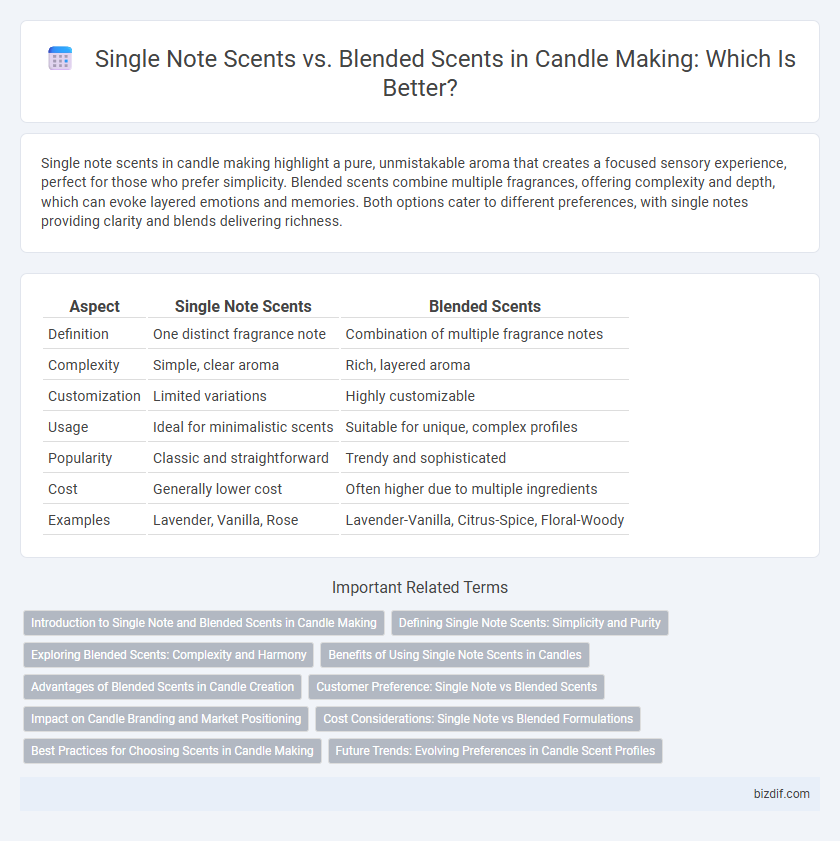Single note scents in candle making highlight a pure, unmistakable aroma that creates a focused sensory experience, perfect for those who prefer simplicity. Blended scents combine multiple fragrances, offering complexity and depth, which can evoke layered emotions and memories. Both options cater to different preferences, with single notes providing clarity and blends delivering richness.
Table of Comparison
| Aspect | Single Note Scents | Blended Scents |
|---|---|---|
| Definition | One distinct fragrance note | Combination of multiple fragrance notes |
| Complexity | Simple, clear aroma | Rich, layered aroma |
| Customization | Limited variations | Highly customizable |
| Usage | Ideal for minimalistic scents | Suitable for unique, complex profiles |
| Popularity | Classic and straightforward | Trendy and sophisticated |
| Cost | Generally lower cost | Often higher due to multiple ingredients |
| Examples | Lavender, Vanilla, Rose | Lavender-Vanilla, Citrus-Spice, Floral-Woody |
Introduction to Single Note and Blended Scents in Candle Making
Single note scents in candle making feature a singular fragrance, highlighting the pure essence of one specific ingredient such as lavender, vanilla, or sandalwood, which creates a straightforward and easily recognizable aroma. Blended scents combine multiple fragrance notes, like citrus with jasmine or cedarwood with amber, to produce complex, layered aromas that evolve during burning and enhance mood and ambiance. Choosing between single note and blended scents depends on desired candle character, with single notes offering simplicity and blends providing depth and sophistication.
Defining Single Note Scents: Simplicity and Purity
Single note scents in candle making emphasize simplicity and purity by featuring a singular, distinct fragrance extracted from one source, such as lavender or vanilla. These scents allow for a clear, unambiguous aromatic experience that highlights the natural qualities of the essential oil or fragrance used. Single note candles are preferred for their straightforwardness, making them ideal for minimalistic or therapeutic environments where a focused scent is desired.
Exploring Blended Scents: Complexity and Harmony
Blended scents in candle making combine multiple fragrance notes to create complex and harmonious aromas that evolve over time, offering a richer sensory experience than single note scents. These blends often balance top, middle, and base notes, enhancing depth and longevity while evoking layered emotions and memories. Skilled artisans use precise ratios of essential oils and fragrance compounds to craft unique scent profiles that captivate and sustain interest throughout the candle's burn.
Benefits of Using Single Note Scents in Candles
Single note scents in candles offer a pure, unadulterated aroma that allows each fragrance's natural characteristics to shine, providing a clear and consistent sensory experience. These scents are ideal for creating a minimalist ambiance and are easier to formulate for balanced wick and burn performance. Using single note scents also simplifies the candle-making process, reducing the risk of scent masking and ensuring a more predictable throw strength.
Advantages of Blended Scents in Candle Creation
Blended scents in candle making offer a richer and more complex aromatic experience by combining multiple fragrance notes that harmonize and enhance each other. These multi-layered scents provide a unique depth and character, making the candle more appealing and memorable to users. Blended fragrances also allow candle makers to customize and differentiate their products, increasing marketability and consumer satisfaction.
Customer Preference: Single Note vs Blended Scents
Customer preference in candle making often hinges on the distinction between single note and blended scents. Single note scents highlight a pure, unmistakable aroma such as lavender or vanilla, appealing to those who favor simplicity and consistency. Blended scents combine multiple fragrances like citrus with floral or woody undertones, attracting customers seeking complex, layered experiences that evolve over time.
Impact on Candle Branding and Market Positioning
Single note scents create a strong, easily recognizable brand identity by emphasizing purity and simplicity, appealing to niche markets seeking specific aromas. Blended scents offer complex, layered experiences that enhance brand sophistication and attract a broader audience, supporting premium positioning in competitive markets. Choosing between single note and blended fragrances directly influences consumer perception and market differentiation strategies in the candle industry.
Cost Considerations: Single Note vs Blended Formulations
Single note candle scents typically cost less due to their simpler formulation and fewer raw materials required, making them ideal for budget-conscious makers. Blended scents involve combining multiple fragrance oils, increasing production complexity and cost because of ingredient diversity and balancing efforts to achieve a harmonious aroma. Choosing between single note and blended formulations impacts pricing strategies, raw material sourcing, and potential profit margins in candle making.
Best Practices for Choosing Scents in Candle Making
Single note scents provide a pure, focused aroma ideal for minimalistic candle designs, ensuring clarity and consistency in fragrance release. Blended scents combine multiple fragrance notes to create complex, layered experiences, enhancing mood and ambiance with depth and character. Best practices for choosing scents in candle making involve testing compatibility with wax types, considering scent throw intensity, and balancing top, middle, and base notes for a harmonious olfactory profile.
Future Trends: Evolving Preferences in Candle Scent Profiles
Single note scents in candle making emphasize purity and simplicity, appealing to minimalist fragrance enthusiasts, while blended scents offer complex, layered aromas favored by consumers seeking unique sensory experiences. Emerging trends indicate a growing demand for hybrid scent profiles combining natural essential oils with innovative synthetic notes to create personalized and long-lasting aromas. Future candle scent preferences will likely involve customizable blends aligned with wellness and eco-conscious values, driving innovation in sustainable and therapeutic fragrance formulations.
Single note scents vs Blended scents Infographic

 bizdif.com
bizdif.com